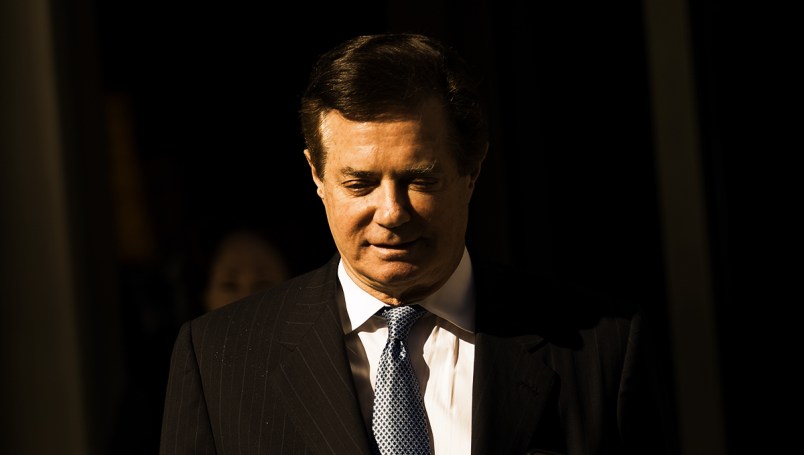ALEXANDRIA, VA — Former Trump campaign aide Rick Gates took the stand Monday to testify against his former boss, Paul Manafort, who’s been charged with tax fraud and bank fraud in special counsel Robert Mueller’s probe.
Gates made it through a little more than an hour’s worth of questioning — which was interrupted repeatedly by U.S. District Judge T.S. Ellis, who scolded prosecutors for certain topics of inquiry — that was focused mainly on the work he and Manafort did together in Ukraine that predated Trump’s campaign.
An attorney for Manafort, Kevin Downing, let it slip earlier in the afternoon that Gates would testify on Monday, intensifying the tension in the courtroom. Several people ran out of the courtroom when Downing uttered the name “Gates,” earning a scolding from Ellis for being “disruptive.”
As members of the press and the public waited anxiously for Gates to take the stand, people lobbied aggressively for good seats in the courtroom and the court security had to ask people to quiet down several times.
Before getting into the details on his Ukraine work, Gates testified that he and Manafort committed crimes together, and also copped to bloating expense reports to obtain additional money from Manafort’s business, a scheme of which he said Manafort was unaware. Gates said he made the government aware of the scheme, which was not among the initial charges he faced before pleading guilty, as part of his cooperation with prosecutors.
Gates also spoke broadly about the bank fraud allegations made in the case. He said he assisted Manafort with a number of loans Manafort was seeking, and that he provided fraudulent and altered documents to support those loans. Gates himself did not benefit from those loans, he said.
Prosecutor Greg Andres ticked off a number of overseas entities that Gates said he and Manafort controlled. These entities were mainly in Cyprus, but also in the Grenadines and elsewhere. Among the tax charges Manafort is facing in Virginia is failure to report the foreign bank accounts. He has pleaded not guilty to that and the other charges he is facing, both in Virginia and in a separate case in Washington, D.C.
Gates said that the foreign accounts were used to receive income they made from their work as political operatives in Ukraine. He said on Monday that, “at Mr. Manafort’s request,” he lied to Manafort’s accountants about Manafort’s control over certain foreign accounts.
Some of that money was then transferred to American accounts, while some of it remained in Cyprus, according to his testimony. A lawyer in Cyprus nicknamed “Dr. K,” for whom Manafort did some political consulting work, helped them set up the accounts, Gates said.
Gates said that Manafort had indicated to him that the Ukrainian businessmen who were funding their consulting work had directed him to set up the accounts in Cyprus, where they also had bank accounts. Prosecutors also asked Gates about the specific businessmen in Ukraine who paid Manafort millions for his political consulting work.
In court today, prosecutors walked Gates through his plea agreement and the charges he had faced before he pleaded guilty and began cooperating with the government. During that part of Gates’ testimony, he said that he lied in a deposition — part of an unrelated case — about the private equity firm run by Manafort’s consulting group. Gates did not get into the details on when the deposition took place and who was involved, but said that the principal of the firm had also been deposed. Gates said that Manafort “asked me not to include certain things in the deposition.”
Though he was in court to testify against Manafort, Gates offered praise of Manafort’s consulting abilities, which he said brought ex-President Viktor Yanukovych “back from the proverbial political dead.”
Manafort, Gates said, was probably the “most politically brilliant strategist I’ve ever worked with.”
Gates also mentioned one of his recent employers, President Donald Trump, though he did not use his name.
“I worked for one of the presidential candidates most recently,” Gates said while providing biographical details to the courtroom.
Judge Ellis got frustrated with some of the questions Andres asked Gates throughout the afternoon, specifically about his Ukraine work. Ellis repeatedly scolded and raised his voice with Andres as they discussed the necessity of certain areas of inquiry, such as the stamps on Gates’ passport showing his travels of Ukraine.
“Let’s get to the heart of the matter,” Ellis growled.
“We are at the heart of the matter,” Andres shot back.
“Just listen to me!” Ellis shouted at the prosecutor. The judge twice requested the lawyers to his bench, out of the earshot of the jury and the public, to discuss their approach to questioning.
After the jury was recessed, the judge and the prosecutors continued to debate the relevance of some of the prosecutors’ questions. Ellis asked Andres to explain why he was asking questions about the nature of the businessmen’s payments to Manafort and about whether the businessmen benefitted from paying for campaign work.
“You don’t need to throw mud at these people,” Ellis told Andres, referring to the Ukrainian businessmen.
Andres eventually explained that he was trying to make clear the flow of money and that he felt it was necessary to explain how political contributions differ in Ukraine.
At the end of the day, the prosecutors said they expected to have three more hours worth of direct questioning for Gates. Ellis implored them to focus their questioning “very sharply.”







Organized crime. We believe.
Well now Rick, you think about that. Basically he brilliantly consulted himself into jail for a hundred million years with his brilliance.
"Manafort, Gates said, was probably the ‘most politically brilliant strategist I’ve ever worked with.’ "
And you have worked with exactly how many strageists, Mr. Gates?
What is Ellis’ game here?
That’s it, butter him up before chopping off his legs in a single swing.